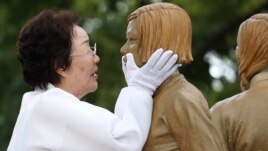21 April 2021
A South Korean court on Wednesday rejected a claim by victims of Japanese wartime sexual slavery and their relatives. The group was seeking payment from Japan's government.
The Seoul Central District Court said its decision was based on rules of international law that give countries protection from the authority of foreign courts. Japan says all wartime payment issues were settled under a 1965 treaty that provided $500 million in economic aid to South Korea.
Activists representing sexual slavery victims said in a statement that the claimants would appeal the decision. They also said that the court had ignored their struggle to restore the victims' honor and self-respect.

In this Aug. 14, 2019, file photo, Lee Yong-soo, who was forced to serve for the Japanese troops as a sex slave during World War II, touches the face of a statue of a girl symbolizing "comfort women" during its unveiling ceremony in Seoul, South Korea. (AP Photo)
Katsunobu Kabo is Japan's Chief Cabinet Secretary. He noted the decision conflicted with a January ruling in a separate case that found the Japanese government responsible for paying sexual slavery victims. In that case, the court called for Japan's government to give 100 million won, about $89,000 each to a group of 12 women.
Kato said he would not comment on the new ruling before examining the details more closely. But he said that Japan's position on the sexual slavery issue remains unchanged. He said the earlier court ruling violated international law and was unacceptable.
"Japan continues to strongly ask South Korea to take appropriate steps in order to correct the state of international violation," he said.
The court in Seoul said international law and earlier rulings from South Korea's Supreme Court make it clear that foreign governments should be protected from civil legal cases in respect of their sovereignty.
The court also noted that the countries never officially withdrew from a 2015 agreement that attempted to settle their dispute over the issue. Some Korean victims accepted payments from a Japanese-supported organization created by the deal. This shows it is possible for the countries to settle their dispute diplomatically, the court said.
South Korea's Foreign Ministry said it would not make comments on Wednesday's ruling before examining the details. The ministry urged Japan to act in line with its past statements, including a 1993 statement in which it first admitted forcing women into sexual slavery.
The 20 claimants in the case include four women who were forced to work as sex slaves during World War II and relatives of other women who have since died.
One of the claimants is 92-year-old Lee Yong-soo. She has been campaigning for South Korea and Japan to settle the sexual slavery issue by seeking a judgment from the U.N.'s International Court of Justice.
She says it has become clear the issue cannot be settled through talks or rulings by South Korean courts that have been repeatedly rejected by the Japanese government. She adds that the tension between the governments has hurt friendships between citizens.
"Regardless of the verdict, we will go to the International Court of Justice," she told reporters after Wednesday's ruling.
Tens of thousands of women across Japanese-occupied Asia and the Pacific were forcibly moved to areas used by the Japanese military during World War II. About 240 South Korean women registered with the government as victims of sexual slavery by Japan's wartime military. Only 15 of them are still alive.
The human rights group Amnesty International criticized Wednesday's ruling. In a statement the group said the court failed to provide "justice to the remaining survivors of this military slavery system and to those who suffered these atrocities before and during World War II."
South Korea and Japan have also argued over South Korean court rulings that called for Japanese companies to pay Koreans forced to work in Japanese factories during World War II.
I'm Jonathan Evans.
Kim Tong-Hyung reported on this story for the Associated Press. Jonathan Evans adapted this story for Learning English. Caty Weaver was the editor.
___________________________________________
Words in This Story
atrocity – n. a very cruel or terrible act or action
authority – n. the power to give orders or make decisions : the power or right to direct or control someone or something
appropriate – adj. right or suited for some purpose or situation
honor – n. right or suited for some purpose or situation
verdict – n. the decision made by a jury in a tria